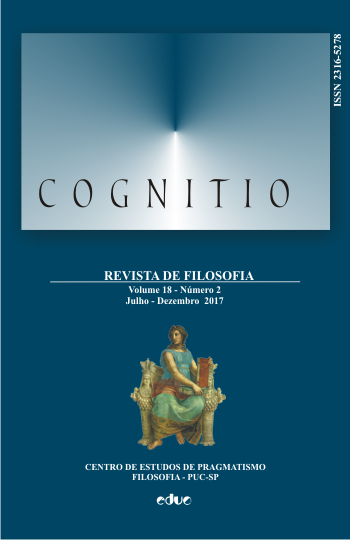The role of aesthetic play of musement in Charles S. Peirce’s “Neglected Argument for the Reality of God”
DOI:
https://doi.org/10.23925/2316-5278.2017v18i2p173-186Keywords:
Charles Peirce, Musement, Neglected Argument, God, Realism,Abstract
This paper intends to briefly reflect on an important and heuristic subject in the architectonic philosophy of Charles Sanders Peirce, to wit, the role of the concept of aesthetic play of musement in the advent and establishment of a pragmatic belief in the hypothesis of the reality of God. Within the available space constraints, after exposing the stages of the neglected argument for the reality of God, developed by Peirce in a homonymous text, we shall show how the concept of aesthetic play of musement is deeply grounded on the author’s realist ontology and how this concept, though it may appear, specifically, as the first stage of a thought process on notable elements of the real universe, a free and purposeless mental state, that does not intend to mediate anything, such as self-controlled thought would do, but that can, however, result in the feeling of being before some of the wonders of the three universes of experience, ultimately becomes a process of pondering with an instinctive appeal towards one’s conduct in life, with that being exactly its profound and notable pragmatic meaning.Downloads
Published
2018-02-03
How to Cite
Almeida, R. V. de. (2018). The role of aesthetic play of musement in Charles S. Peirce’s “Neglected Argument for the Reality of God”. Cognitio: Revista De Filosofia, 18(2), 173–186. https://doi.org/10.23925/2316-5278.2017v18i2p173-186
Issue
Section
Cognitio Papers









